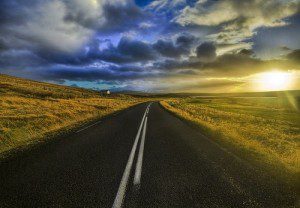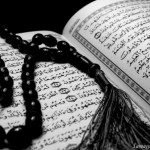This article comes on Day 11 of our special Altmuslim/Patheos Muslim Ramadan #30Days30Writers blog project, in which we are showcasing the voices of 30 Muslim leaders, activists, scholars, writers, youth and more (one on each day of Ramadan) as part of our commitment to own our own narratives and show how we are one Ummah, many voices. To demonstrate how our Ramadan experiences are shared yet unique to each of us.
I became a Muslim two decades ago. Seven years later, I married the man who would become the father of my son; Ibrahim arrived a year later. By that point, a hijab sat on my head and I lived in Central Asia. I returned to the United States before moving to the Middle East, with back-and-forth trips to Pakistan throughout. I experienced Islam and Ramadan in many places around the world.
I rarely experienced Ramadan internally.
When I left the marriage two years ago, the hijab came off, and I relegated my Islamic identity to a need-to-know basis in my daily life (even though a quick Google search of my name would have revealed all). My knees bent in prayer, but I easily morphed into American society as just another blond girl. I had not been one of those in a long time. As a blond girl, I had brazen experiences like tattoos, ear gauges, and hipster haircuts. I had great fun even though I didn’t always know what to do with myself.
Last Ramadan, I provided myself a thousand excuses why I couldn’t fast. Most were legitimate; a few were not.
I fretted as this Ramadan approached. Fellow Muslims were preparing overnight oatmeal, Islamizing the World Cup and preemptively celebrating what would be a grueling summer fast. Even BuzzFeed featured Ramadan content. Suddenly, social media was fasting this year while Chinese Muslims were legally prevented from doing so.
I had no valid excuse to opt out.
To be honest, I had started to miss something about the experience. I couldn’t quite identify what stirred my longing. Perhaps I intuitively needed hunger as well as the sweet release of that first sip of iftari water. My soul seemed parched around the edges. I wondered if Ramadan might provide much needed self-tenderness, but the how part remained vague and unsure. I could not fathom that I would be able to sustain the sixteen-hour long day.
Yet, I was not the same person who had fasted during the first two decades of my Islam. Self-loathing had defined most of my life, and only recently had I started to feel good about myself. Perhaps I wanted to go through Ramadan once again to see who waited on the other side of it.
I set my alarm for suhoor and hoped that I could make this journey without incident.
**********
Fasting dictated that my Islam would now be proud, loud and in the face of my co-workers and others I came into contact with on a daily basis. I didn’t want to explain why I was fasting; I desired a private exercise of personal reflection. Things don’t work that way, however. At a Fourth of July party, the Ramadan conversation obviously emerged.
“Now, explain this to me,” an older woman kindly asked. “What is the point of this Ramadan – is that how you say it?”
I took a deep breath to subdue anxiety while I searched for something non-clichéd to share. I did not feel to be the best representative for this particular task, but I ferried forth. “Ramadan provides the reflective experience of deprivation.” I began, unsure if I had found the right footing for the conversation. “In this society, for example, we don’t fully understand deprivation as spiritual exercise. The experience helps build compassion for others as well as self-discipline. We must also be compassionate in our thoughts and actions. It is like we deprive ourselves of negative thinking, which is harder than one realizes.”
Oh, that makes sense, she chimed in. Another person agreed that American society doesn’t understand the concept of deprivation, philosophically or otherwise. But I remained unhappy with my description although it seemed apt enough.
“And …” I resumed, “for me, at least, it is a metaphor for the spiritual journey and for the state of our soul.” The older woman now dangled a cigarette from her fingers.
“What to you mean?” she asked.
I tilted my tired, hungry head to find the right verbiage. “We are sometimes distant from God — whatever God means to us individually — and our soul is in a state of hunger and thirst. We may not realize it, but the sluggish, crabby nature that evolves from a spiritual deprivation becomes a metaphor for that distance. There is physical hunger, but also managing the emotional barrage of negative thoughts forces us to admit a distance from God. We must first feel and then acknowledge the distance.”
She took a drag from her cigarette and commented that she understood deprivation having been raised Catholic.
I explained that when the sun starts to descend and we finally eat, that becomes a metaphor for spiritual sustenance. Even in the darkest places of our existence, the possibility of nourishment is never denied. As we reach for the Creator, there is replenishment.
**********
That informal explanation of Ramadan is not one that I had heard from any minbar, but it made sense to me. I realized that I had experienced a self-imposed two-year drought from the shared experiences of my faith. But this year, I greeted the magnificent month with new aspects of my persona that I liked. The creative edges of my life that I had felt obliged to hide during my marriage now wanted the hunger, the struggle and then release after the deprivation.
I had arrived at a point where I felt worthy of mercy, and Ramadan loomed as a way show myself some kindness. Just as I had to control my thoughts towards others, I also had to treat my personal experience with love.
Moments of spiritual distance and deprivation are necessary stops along the straight path. Getting lost is one way to reorient towards the Divine. When we finally arrive at the feast, we are even more appreciative and grateful for the lessons learned during the time of hunger.
Deonna Kelli Sayed is a Love, Inshallah contributor and a LoveInshallah.com editor. She is a published author and an emerging digital storyteller. Her work is also found at altmuslimah.com, Muslimah Media Watch, and storyandchai. Deonna is currently working on a memoir with support a Regional Artist Grant from the North Carolina United Arts Council. To learn more, visit deonnakellisayed.com and join her on Twitter @deonnakelli













